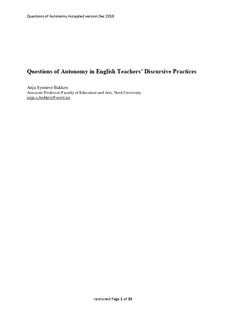| dc.contributor.author | Bakken, Anja Synnøve | |
| dc.date.accessioned | 2019-12-03T08:58:39Z | |
| dc.date.available | 2019-12-03T08:58:39Z | |
| dc.date.created | 2019-04-10T20:31:12Z | |
| dc.date.issued | 2019 | |
| dc.identifier.citation | Educational Research. 2019, 61 (1), 105-122. | nb_NO |
| dc.identifier.issn | 0013-1881 | |
| dc.identifier.uri | http://hdl.handle.net/11250/2631379 | |
| dc.description.abstract | Background: Recent educational legislation has redefined and extended teachers’ space for exercising professional autonomy. For instance, Norwegian English teachers enjoy substantial freedom in choosing texts for classroom use, provided they meet the competence aims of the national subject curriculum. Teachers are expected to use their professional judgement when choosing the means and modes of teaching to meet local needs. At the same time, current educational legislation requires that teachers exercise their autonomy as participants in ‘professional communities’ to ensure common standards for teaching and to assume shared responsibility for the pupils’ learning. Purpose and method: The research question is whether the redefined space for professional autonomy corresponds to teachers’ understanding of such autonomy. In this article, I address this question through an analysis of lower secondary teachers’ discourses underlying the selection of texts for their learners of English as a Foreign Language. A total of 18 teachers were interviewed and a critical discourse analysis approach was used for data analysis. Findings: Findings suggest that the teachers’ reasoning about text choice and teacher autonomy are negotiated between two potentially competing discourse positions. The first promotes individual freedom of choice, and the second is the view that the textbook represents an authoritative interpretation of syllabi aims, as well as a premise for the teachers’ common planning. Although the teachers speak in favour of choosing texts freely, few say they exploit this freedom beyond choosing between texts in the textbook. In addition, decisions to deviate from the textbook appear to be viewed as hinging primarily on the individual teacher’s discretion. Conclusion: Thus, possibilities for change rely mainly on individual teachers and are placed outside the sphere of collective planning. I argue that the teachers’ discursive practices may limit rather than extend their space for exercising professional autonomy regarding this area and that the textbook plays an important role in this. | nb_NO |
| dc.language.iso | eng | nb_NO |
| dc.publisher | Taylor & Francis | nb_NO |
| dc.title | Questions of autonomy in English teachers' discursive practices | nb_NO |
| dc.type | Journal article | nb_NO |
| dc.type | Peer reviewed | nb_NO |
| dc.description.version | acceptedVersion | nb_NO |
| dc.source.pagenumber | 105-122 | nb_NO |
| dc.source.volume | 61 | nb_NO |
| dc.source.journal | Educational Research | nb_NO |
| dc.source.issue | 1 | nb_NO |
| dc.identifier.doi | 10.1080/00131881.2018.1561202 | |
| dc.identifier.cristin | 1691475 | |
| dc.description.localcode | Locked until 29.07.2020 due to copyright restrictions. This is an [Accepted Manuscript] of an article published by Taylor & Francis in [Educational Research on 29.01.2019, available at http://wwww.tandfonline.com/[Article DOI: 10.1080/00131881.2018.1561202]. | nb_NO |
| cristin.unitcode | 194,67,80,0 | |
| cristin.unitname | Institutt for lærerutdanning | |
| cristin.ispublished | true | |
| cristin.fulltext | postprint | |
| cristin.qualitycode | 2 | |
